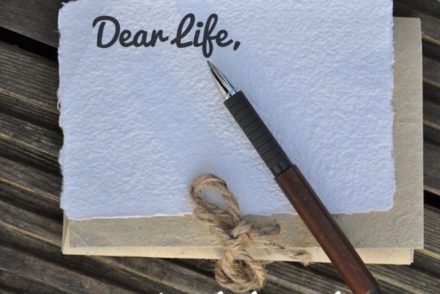 Welcome to Dear Life: An Unconventional Advice Column.
Welcome to Dear Life: An Unconventional Advice Column.
Your questions get sent to various authors from around the world to answer (and please keep sending because I have like 567 writers that want to answer your burning questions. Click here to submit a letter or email dearlife@jenniferpastiloff.com.) Different writers offer their input when it comes to navigating through life’s messiness. We are “making messy okay.” Today’s letter is answered by Angela G. Patel, who also is an editor for this site (and one of my closest friends) and… who is attending my Writing + The Body retreat in a couple weeks with author Lidia Yuknavitch! The retreat is sold out but email info@jenniferpastiloff.com to be added to wait list.
Send us your questions because there loads of crazy authors waiting to answer ‘em. Just kidding, they aren’t crazy.
Well okay, maybe a little. Aren’t we all? xo, Jen Pastiloff, Crazy Beauty Hunter. ps, I will see you in Vancouver in a couple weeks! My first workshop there!

Jen Pastiloff is the founder of The Manifest-Station. Join her in Tuscany for her annual Manifestation Retreat. Click the Tuscan hills above. No yoga experience required. Only requirement: Just be a human being.
By Angela Giles Patel.
Dear Life,
Men We Reaped, Jesmyn Ward’s remarkable memoir, an extended exploration of the deaths of five young black men in a Mississippi community (including Ward’s own brother), caused me to look anew at my own life, which also has been marked by trauma: Sudden loss of a parent at a young age; chaotic adolescence culminating in pregnancy and marriage at the age of 18; a marriage marked by violence and drug abuse (my husband’s); an acrimonious divorce followed by a decade of custodial interference; single parenthood in a hostile urban environment; poverty; emotional instability; the experience of 9/11 as a resident of New York City; life-threatening disease; the sudden loss of an adult child; and now the recurrence of life-threatening disease. Yet I am white, well-educated (MFA from a major university), well-spoken, and, for now, after many years of struggle, financially comfortable. So people assume—and I generally do not set them straight unless I know them very well—that I have led a relatively easy life. Largely because of the trauma in my life, I stopped writing for many years, only recently picking it up again and finding great solace in the process.
The question that plagues me? Who, exactly, is my peer group? White people of my educational status and socioeconomic station seem to lead suchcharmed lives in comparison. Yet who else available to me has the literary insight to give me the feedback my writing needs? Because of the lag between my MFA experience and my return to writing, I have lost touch with my teachers. And while I generally felt supported and valued by those teachers, I felt like a fish out of water when it came to the other students.
I recently moved out of New York City to a much smaller city in a different region of the country. In my new town, I have spent time in a critique group with other writers, all of them younger than me, some of them with children still at home, most of them married, all healthy…. And while they have been generous and insightful in many ways, as I continue writing I feel the lack of an essential understanding, and I feel increasingly that the poems and other writings (fiction and nonfiction) I am excavating from my traumatized interior are burdensome to them and impinge on the happy lives they are trying to build and maintain. I don’t think it’s a matter of age, although I am sure that age plays a role (I am in my mid-50s). Most writers in workshops are relatively young. Older writers with the skill to offer literary criticism tend to be 1) successful already and, hence, unlikely to be interested in offering criticism on a regular basis, and 2) ready to settle back and not work (or network) so hard, having already established connections with other writers and artiststheir age.
My question really is an existential one in this era when the fortunate can afford to isolate themselves from the unfortunate—and usually prefer to—and tend to be fundamentally uncomfortable hearing about difficult life experiences. Yet, I feel very strongly that the unfortunate often have extraordinary insight into the true nature of this earthly existence—but very few avenues for expressing it. I don’t know how I would have survived, emotionally and intellectually, without books by writers like Jesmyn Ward, Viktor Frankl, Sylvia Plath, and others that reflected my own inner experience.
Somewhere there must be good writers who can offer feedback without feeling uncomfortable about difficult subject matter, who have the personal and artistic integrity to see the intrinsic value of such subject matter, and who can offer literary criticism without trying to psychoanalyze the writer in the process (a common problem). How do I find them?
I know it is important, in the meantime, to continue writing. I know someone else’s response shouldn’t be the dominant reason one writes. And yet it is hard to continue over time without a peer group and without feedback. One can only get so far on one’s own.
Thanks for the chance to pose my question,
Aspiring Writer
Dear Aspiring Writer,
The comfort you have found in writing is quite familiar to me and you are absolutely right, there is great solace in the process. As writers we have to write, even when it hurts. And there comes a time when every writer has to decide if they want to share what they have written.
Clearly, you are at the stage with your work where you want your voice to be heard, but I am not convinced that you are looking for peers. I am even less convinced that the peers you think you deserve exist. Your criteria is stringent and exclusive, and by that I mean terribly narrow. You dismiss younger writers because they are inexperienced and can’t relate to your work, and you dismiss older writers because they are above putting in the time you think your writing deserves. You want to have people who can relate to your pain read your writing, but they need to be of a certain class so that they can offer you “literary” feedback. No matter how good your writing is, and I have no doubt it is good, you have whittled your potential peer group to a nub.
Here’s a thought: stop looking for a peer group and start looking for a tribe. Look for people who connect with your soul, not your experiences. Put together a group that can give you a variety of opinions. Don’t dismiss feedback because it isn’t literary enough, some of the best feedback you will ever get will be a gut reaction rather than a clever assessment. Honest feedback will tell you when you are being self-indulgent, so here is some honesty: you need to look at why you want people to interact with your work. If it is to congratulate you on what you survived, that’s fine but you need to own that and not hold unsuspecting readers accountable. If it is to get feedback on the quality of your work, you need to own that as well, because it takes a heavy dose of humility to have your painful experiences rejected, trust me on that one.
If you are writing for more than you, if you are writing because you feel diminished if you don’t write, if you are seeking to hone your craft, then absolutely get your work in front of people however you can. Go to readings, check out a local indie bookstore for author events, ask booksellers about book clubs and writing groups. There are also a number of online forums for writers. Stanford has a decent writing program that covers most genres. LitReactor has classes as well as reading groups. You get the idea.
Be prepared though, the hardest part of getting feedback is really listening to the feedback. You need to be humble enough to hear what is being said, grateful enough to listen to the finish, gracious enough to be grateful, and brave enough to reflect on it. Believe me, it’s not easy. Rejection hurts, especially when it is a rejection of your own experience and pain. But it happens. Often. Never forget that you can learn something from everyone you share your work with. As you form your tribe, feel free to send a sample of your work to “Dear Life” and I will be happy to chime in.
All the best,
Xx Angela
Please note: Advice given in Dear Life is not meant to take the place of therapy or any other professional advice. The opinions or views offered by columnists are not intended to treat or diagnose; nor are they meant to replace the treatment and care that you may be receiving from a licensed physician or mental health professional. Columnists acting on behalf of Dear Life are not responsible for the outcome or results of following their advice in any given situation.







2 Comments
Angela, wow. That is generous, spot-on advice, beautifully written.
To the OP, you might be surprised at the number of people you’ll come across (even if you live in Mayberry RFD) who will relate to your trauma. Everyone’s life is traumatic. At least every writer I know. (I realize that’s a sweeping generalization. No need to flame the comments section and tell me how un-traumatic your life was. Goody for you. Go have a cookie and call your Mom/daughter/father/son and leave the rest of us traumatized writers in peace.) Seriously, OP, your tribe is out there. Even in your new location. If you’ve ended up in one of those Pleasantville workshops where people only say positive things, GTFO of there and find a different one. I don’t know about you, but I don’t want to hang out with people who are fundamentally uncomfortable hearing about difficult life experiences. Not in a workshop, or a coffee shop, or especially not in my living room. The good news is (and I’m going to throw some armchair psych on you right now; discard it–like anything–if it doesn’t ring true) that I think you might (maybe, possibly) be projecting a little bit on to the people you share your work with, since it seems to be such an ongoing struggle. In the spirit of Jen Pastiloff’s Don’t Be An Asshole campaign, I’d like to posit the theory that when you run into four assholes on the same day, there’s a good possibility that you’re the asshole. I’ve been the asshole (and I probably will be the asshole again) in workshop situations where I thought that my work was better/different/special. You know what? It wasn’t. No one is a special snowflake. And it’s all in the art. You get no credit for living. I didn’t say that, VS Pritchett said it, but it seemed weird to throw quotes around it. DO YOU SEE? I can even be the asshole in a comment. Sigh. Anyway, keep looking and keep speaking your truth. If people really, truly are uncomfortable about the topics you’re writing about, they’re not the right audience for your work. But, like Angela said, shedding some of the other restrictions you’ve put on potential readers will open up a lot of possibilities. You might get amazing notes from the kid with the unfortunate Nine Inch Nails tattoo on his forearm and the 2-inch ear gauges.
I loved the courage and compassion of both writers here. For the OP: I had a horrific childhood, marked with awful trauma, and yet today I can easily “pass” as someone who has danced through life with every charm. Angela suggests, I’ve surrounded myself with people who understand me, and this large group includes cab drivers, artists, housecleaners, foster parents, and so forth. In addition to Angela’s great suggestions, I’d add one more: find someone else to help. Sometimes the best antidote to feeling lonely is to help others. There are TONS of programs that would love a MFA trained volunteer…there are programs to help prison inmates learn how to write; classes held in public libraries for the poor; programs in at-risk schools. I like to volunteer in the same schools I attended as a child, showing the kids it is possible to grow up extremely poor and yet become a writer. Channeling your experiences into helping others is one of the best ways to feel a sense of belonging and purpose.